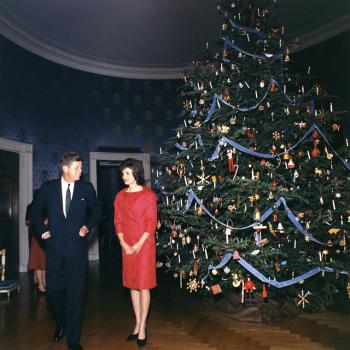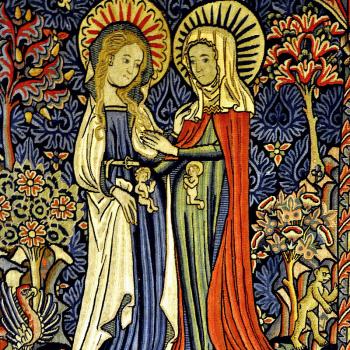A beautifully decorated tree forms the center-piece of the snow-dusted city square, festive lights are everywhere, holiday music is beaming from every radio, and children flock to sit on the knee of a bearded red-suited jolly grandfather figure. Everyone knows that this is the most wonderful time of the year. But the holiday described here is not Christmas, even if it looks and sounds so much like it. Rather, I am describing the secular New Year celebrations in Soviet Russia, which closely replicated Christmas traditions, minus any religious overtones (since religion was officially illegal during the entirety of Soviet rule). The similarity extends, even, to one genre of entertainment that has come to be one of the most popular parts of the holiday season for some — the holiday rom-com films, which generally revolve around a couple of great-looking but unlucky-in-love people, finally finding each other in time for the holidays.

New Year tree on the Red Square in Moscow, Russia.
Yes, these films generally have the same plot — as one meme recently seen on Facebook notes, “Basically, Hallmark has made 437 Christmas movies using 17 actors, five locations and three different plots.” In part, perhaps, because of this lack of sophistication, we do not generally think about holiday rom-coms historically, but in my last post for 2021, I would like to do just that. What might we, as historians and as Christians, learn from the striking similarities between the American Christmas rom-coms and their Soviet New Year-themed counterparts?
One of the most popular such films during my childhood in Soviet Russia in the 1980s, was titled The Irony of Fate, or Enjoy Your Bath. Really, the second part of the title “s legkim parom” is one of those untranslatable idiomatic expressions: it is what you say to someone going to a traditional Russian steam bathhouse: “Have a nice steam!”

Cover of the DVD version of the film.
The plot unfolds as follows. A group of friends in Moscow enjoy a wild night of celebrations on New Year’s eve, including going to a Russian bathhouse and consuming copious amounts of distinctive beverages for which Russian celebrations are so well-known. At the end of the night, one of the friends is supposed to fly to Leningrad (now St. Petersburg), so the group escorts him to the airport and helps him board his plane (oh, the days when one could just do that!). But in the confusion stemming from the aforementioned Russian beverages, they get the wrong guy from the group on the plane. And so, the film’s protagonist, Zhenya, flies to Leningrad without quite realizing what happened. When he disembarks, he takes a taxi from the airport to follow the familiar route home along the neighborhoods and buildings that look just like the part of Moscow where he lives.
This initial portion of the film makes fun of the uniform style of Soviet buildings of the Brezhnev era. The cookie-cutter new neighborhoods, high-rise buildings, and apartments indeed looked alike in every way, down to the furniture. Illustrating the point, the protagonist’s address in Moscow on Third Builders’ Street turns out to have an identical counterpart in Leningrad. And so, the taxi driver has no problem driving Zhenya home from the airport to the address provided. Even Zhenya’s apartment key works without a hitch when he lets himself in. His first clue that maybe something is amiss is when he gets into the apartment, and someone appears to have rearranged his furniture. But he does not dwell on this detail too long, and goes to sleep.
Of course, since this is a rom-com, what results from this comedy of errors is a nice boy-meets-girl story, since (you guessed it!) a lovely young woman, who happens to be named Nadya, lives in the Leningrad apartment to which our protagonist accidentally stumbled. And once the confusion is sorted, after a very lengthy set of meandering circumstances that evening, including Nadya’s breakup from her previous relationship, which obviously wasn’t going to work out anyway, Zhenya and Nadya get together at the end of the film, just in time for New Year. What better time to find true love?
No one watches rom-coms for the sophistication of their plots. In fact, the analogy to Soviet-era buildings would be just as apt for talking about this genre of films. The American counterpart is similarly simplistic and cookie-cutter in its approach to relationships, as it also glorifies the search for true love, albeit one that looks more like serial monogamy, rather than committed marital relationships. The only difference is that the American Hallmark channel holiday films revolve around Christmas, rather than New Year. But is this even a difference? After all, the version of Christmas in these films has about as much religion involved as the Soviet New Year celebrations — meaning, none. And yet, there is a deeply theological yearning that is inadvertently hiding in these films, and it reminds us of a truth programmed into all of us.
Deep down, we all have a desire to be loved. We know this all the time, but we feel it especially deeply around holidays and in moments that presage new beginnings, such as the New Year. Might this not be one reason why depression rates often spike around the holidays? The world is longing for the kinds of happy endings that these rom-coms dutifully present, because these stories make viewers feel good. And yet, as Christians, we also know the truth: the happy endings that these movies present are superficial and impermanent.
As historians, we know that life was not easy in Russia in the 1970s, just as it is not in modern US. But as Christian historians, we know that there is a bigger story to love and to new beginnings in this time of year, and it is a story that we lose when we focus excessively on the secular aspects of Christmas that would look the same as the Soviet New Year.
The historical roots of Christianity, which give us hope in the season of Christmas, provide a picture of love that is more beautiful than any rom-com film or, let’s face it, human pen could ever tell. What other tale could rival the love story of a God who loved humanity so much as to take on human flesh, live the life of a pauper under an oppressive regime, and die an agonizing death? And it is this incredible love story that promises us now maybe not a happy new year (although we can hope for that as well!), but a happy eternity someday.













